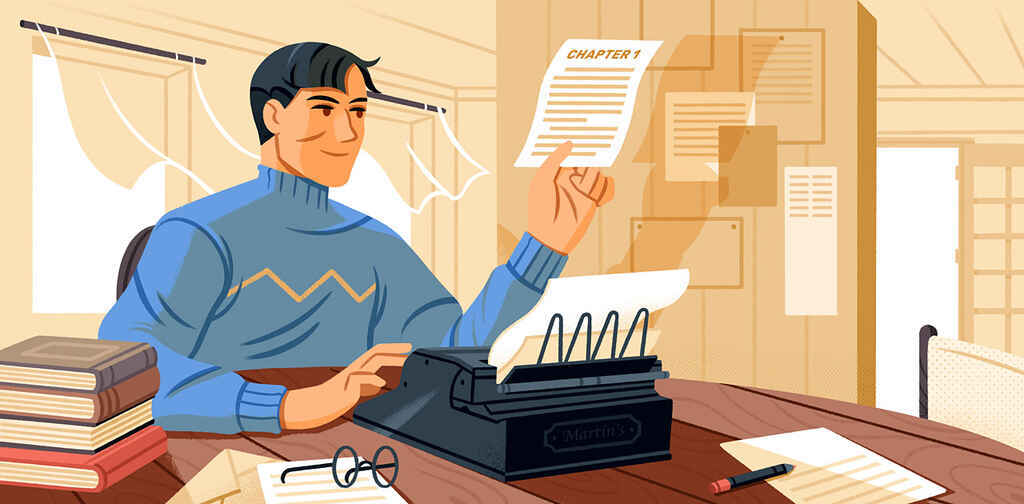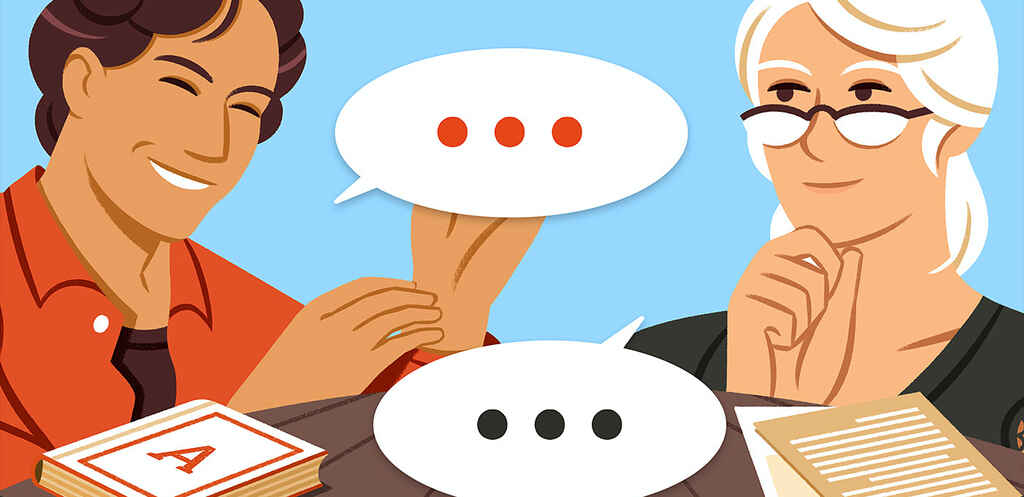Guides • Understanding Publishing
Last updated on Oct 15, 2025
What is a Literary Agent, and How Can They Help You Publish?
Martin Cavannagh
Head of Content at Reedsy, Martin has spent over eight years helping writers turn their ambitions into reality. As a voice in the indie publishing space, he has written for a number of outlets and spoken at conferences, including the 2024 Writers Summit at the London Book Fair.
View profile →A literary agent is someone who works on behalf of and with an author to help them sell their book to a publishing house. They negotiate the best possible terms for their authors' book deals and support them throughout the publishing process and with any future manuscripts.
The vast majority of large publishers don’t accept direct submissions from unagented authors, meaning that agents effectively act as the gateway to traditional publication — so let’s examine what that looks like in practice and what agents do in broader terms.
Literary agents are your entry to traditional publishing
 Back in the early days of publishing (think Brontë and Walter Scott times), writers would mail manuscripts directly to the small handful of publishers in major cities and then await acceptance or rejection. Publishing was simple that way — and it didn’t hurt that only the upper classes had the time or education required to write books.
Back in the early days of publishing (think Brontë and Walter Scott times), writers would mail manuscripts directly to the small handful of publishers in major cities and then await acceptance or rejection. Publishing was simple that way — and it didn’t hurt that only the upper classes had the time or education required to write books.
Fast forward a couple hundred years: many more writers now want book deals than publishers can take on. To handle this influx of new books and authors, presses have come to rely on literary agents as a quality control measure, saving editors from looking through thousands of manuscripts at a time.
With very few established publishers open to “unagented submissions,” securing representation is an almost essential step for any fiction author who want to land a book deal.
They are often your first editor
“I love you, you’re perfect, now change.” Some authors think this when agents give them notes on a manuscript that has just won them representation. It’s worth remembering that agents often take on authors not because their manuscript is flawless and a guaranteed bestseller but because they see the potential — in the concept, story, or writing style.
Many agents come from an editorial background (just as many book editors have previously worked as literary agents). With their understanding of what makes a book work — and what makes it sellable — agents will work with their authors to whip their manuscripts into shape, ready to pitch to publishers.
💡Curious about sellability? Have a look at our checklist for authors researching their book’s market potential.

Give your book the help it deserves
Polish your manuscript (or query letter) with professional help. Sign up for free to meet our editors.
Learn how Reedsy can help you craft a beautiful book.
Agents know how to sell your book
As your chaperone into the world of traditional publishing, your agent isn’t just someone who can walk you through the front door. They also know which doors to approach.
Because they know the industry inside out, agents can carefully pick the editors they know will be most excited to see your manuscript and whose tastes align the most with your project’s aims, effectively increasing your chances of getting a deal. If you’ve written a military thriller, they’ll know which presses are looking for titles to sit alongside Tom Clancy in their backlist. They’ll also know which companies are looking to diversify their list — and whether they can promote your book properly.
A good agent will have a solid professional network and personally know editors at large and small presses — they’re in a position where they can call an editor and say they have an exciting new manuscript to share and have the editor listen actively and attentively.
Having helped you find the right home for your book, let’s see what they can do once you get to the paperwork.
They negotiate the best deal on your behalf
Once your manuscript is in great shape, an agent will pitch your book to a hand-picked selection of editors and publishers. So what next?
If more than one editor is interested, they’ll arrange an auction — a series of phone calls where the agent relays any offers back and forth until every publisher makes their best offer. All you have to do as the author is think about which editor’s offer appeals to you the most — each will submit an edit letter laying out their vision for how you can work together, as well as a plan for how their company can promote your book.
It’s their job to sweat the small stuff
In these discussions with your publisher, your agent will help you make decisions about translation rights, as well as try and help you retain the rights to film and TV adaptations (as you’ll make more money if you don’t have to split any film/TV earnings with your publisher). For Caroline Leavitt, editor and author of the NYT bestseller With or Without You, an agent’s input is invaluable. “If you've ever seen a book contract, they're impossible to understand. I've published 12 books. I still do not understand my contract, but I trust my agent to understand.”
In Caroline’s experience, many of these issues can be complex and technical, so your agent’s job as the mediator is to get you the best possible deal for you while ensuring there is no friction between you and your publisher.
If any friction does arise, your agent will help you manage it without damaging your relationship with the publisher.
Agents will talk to your publisher on your behalf
 Your agent doesn’t just help you land a book deal and then abandon you. They remain present in your communications with your publisher throughout the process of publishing your book — and because they’ve done this before, they know when the publisher’s behavior is falling short of expected standards.
Your agent doesn’t just help you land a book deal and then abandon you. They remain present in your communications with your publisher throughout the process of publishing your book — and because they’ve done this before, they know when the publisher’s behavior is falling short of expected standards.
Award-winning author Eve Porinchak (also a former agent) points out that a literary agent’s job doesn’t end once you have an offer on your book from an acquiring editor at a publishing house. “Your literary agent serves many different roles — coach, cheerleader, business manager, advocate, and negotiator for terms of the contract (including advance money, special clauses, subsidiary rights), and conflicts with the publishing house.”
Even with a deal in the bag and the best possible relationship between the author and publisher, Eve knows it’s not always plain sailing. “Problems can include: not getting paid on time, lack of communication, missed deadlines on editorial feedback, title, and cover issues, and contract breaches, among other things. It's an agent's job to chase down advance and royalty money and serve as liaison to the acquiring editor in mitigating business conflicts.”
As Eve explains, having an agent as an intermediary allows the author to concentrate on their job as a creative, keeping harmony in the author-editor relationship so that those two individuals can focus on the art of storytelling.
You can trust your agent to defend you as fiercely as you would defend yourself because your interests are aligned: they care for you as their partner and depend on your success to get paid.
Literary agencies work solely on commission
Let’s talk about how agents get paid. An agent’s earnings are made up of commission on author earnings. This includes a percentage of the author’s royalties and advance — and, often, a cut of any adaptation deals. If a book isn't sold, agents simply don’t get paid.
💡If you aren’t too clear about how advances and royalties work, check out our post on author earnings.
Penguin Random House former editor and literary agent Matt Belford explains that, while there is no standard legal obligation for agents to only take a certain percentage of their authors’ earnings, there is something of an unspoken rule. “Generally speaking, literary agencies abiding by the canon of ethics from the Association of American Literary Agents take 15% of what they negotiate in terms of advances and royalties domestically, and that can go up to 20% for foreign deals.”
Legitimate agents never ask for upfront payments

Matt emphasizes that with most agencies (which abide by the rule above and the AALA’s ethics code), agents do not get paid until their authors get paid, as they take their commission at the point when author payments come in from publishers, not before.
“This means there shouldn't ever be a reason for an author to pay an agent directly out of their pocket. Agents are fiduciaries, and most often, publishers pay literary agencies directly into a non-interest-bearing account. The agency takes 15% and then passes the money along to the client.”
In Matt’s experience, many publishers are increasingly willing to split the payments on their end and send the commission to the agency and the rest of the payment to the author. Before signing a deal, you should clarify how payments will work, so you aren’t left wondering.
Exercise caution if an agent you’re in talks with asks you for an upfront payment. Your writing career and savings are at stake, so ensure you’re dealing with an honest professional. Research their background and agency, look for evidence that they are legitimate (like successful clients or positive testimonials on social media), and consult a literary lawyer if you’ve got a contract they can scrutinize.
The same applies to agents who contact you out of the blue, saying they’d like to represent you — do your research. If you can’t find out much about them, you could directly ask this agent for information on their background. Or, as Justin Brouckaert of Aevitas Creative Management suggests, ask that they put you in touch with a client who can serve as a reference, something he’s always happy to do for prospective clients.
“While I know that the clients I put forward as references will have good things to say about working with me, those conversations still offer writers the opportunity to ask pointed, granular questions and to sniff out any potential red flags.”
Ultimately, if you aren’t convinced that an agent is legitimate, it is always best to be safe rather than sorry.
Finally, let’s look at whether you’ll need literary representation, as your publishing plans may mean you don’t strictly need one.
Some authors don’t need agents
 By definition, when you employ the services of an agent to represent you, you agree to give away part of your earnings in exchange for an agent’s experience negotiating, persuading editors to take a chance on a book, and general career stewardship. For most traditionally published authors, the decision to work with an agent is a no-brainer — they’re, for the most part, essential to access the hallowed grounds of publishing. But for those authors working in genres that do not require agents (academic publishing, cookbooks, sometimes poetry and nonfiction) or planning to self-publish, agents are not strictly required.
By definition, when you employ the services of an agent to represent you, you agree to give away part of your earnings in exchange for an agent’s experience negotiating, persuading editors to take a chance on a book, and general career stewardship. For most traditionally published authors, the decision to work with an agent is a no-brainer — they’re, for the most part, essential to access the hallowed grounds of publishing. But for those authors working in genres that do not require agents (academic publishing, cookbooks, sometimes poetry and nonfiction) or planning to self-publish, agents are not strictly required.
| Genre | Is a literary agent usually needed? |
| Fiction | Yes |
| Children's books | Yes |
| Poetry | No |
| Nonfiction | Depends |
| Memoir | Yes |
| Cookbooks | No |
| Academic/Educational | No |
From a financial viewpoint, going without an agent does mean you get to keep a larger share of the pie, so if that’s your top priority, perhaps you should consider self-publishing, which can be more lucrative. Generally speaking, though, most traditionally published authors find that the industry knowledge their agents contribute is more than worth their fees. After all, there’s a reason the system is set up the way it is.
If you aren’t sure which publishing path is right for you, worry not. We’ve got a super quick quiz you can take below:
✅
Is self-publishing or traditional publishing right for you?
Takes one minute!
To begin your search for literary representation, check out our post on finding a literary agent, and these related resources:
- Our directory of literary agents where you can filter this by genre and location to find suitable candidates. (click here)
- Our guide to query letters includes tips on writing one, examples of query letters that work, and advice on choosing ‘comp titles’ wisely. (click here)
- Our self-editing tips, to help your manuscript sample move past the slush pile. (click here)
To a stressed writer hoping to get published, it might feel like agents are the literary police, but let’s be clear: agents are just zealous readers who are passionate about bringing great writing to the reading public and are often overworked, having to do much of their manuscript reading on nights and weekends. They aren’t cultural elites who relish sending rejection letters: they want authors to succeed more than anyone.
For agents like WordLink’s Zeynep Sen (also an editor on Reedsy), helping debut authors realize their dream is a big part of their motivation. “Holding a new manuscript in your hands, knowing it’s something special and that you can help deliver it to readers who’ll love and be impacted by it… There’s nothing quite like it.” Look for an agent who feels like that about your work, and you'll be part of a great and rewarding partnership.
In the next part of this guide, learn how you can track down and contact a literary agent who's perfect to represent your book.
